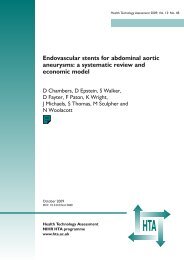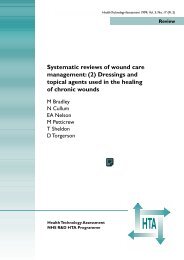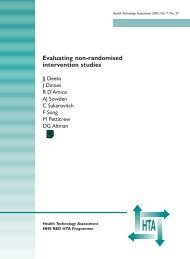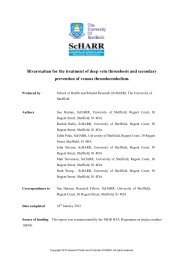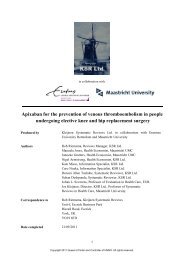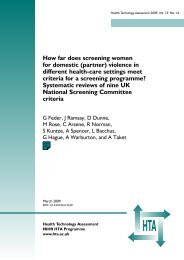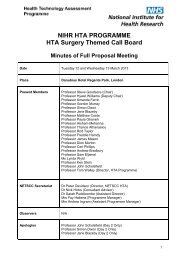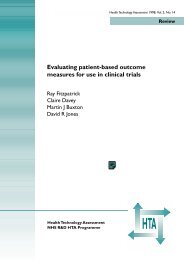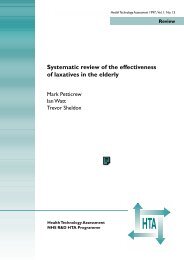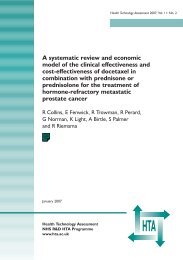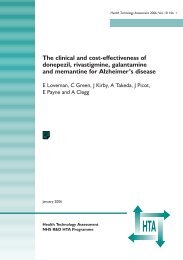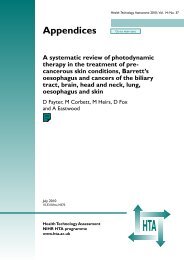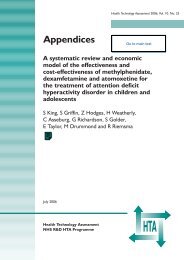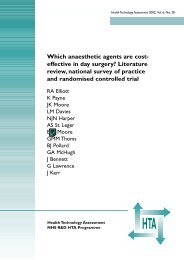A systematic review and economic model of the effectiveness and ...
A systematic review and economic model of the effectiveness and ...
A systematic review and economic model of the effectiveness and ...
You also want an ePaper? Increase the reach of your titles
YUMPU automatically turns print PDFs into web optimized ePapers that Google loves.
46<br />
Clinical <strong>effectiveness</strong><br />
examined MPH administered once daily <strong>and</strong> one<br />
examined MPH given two or more times daily.<br />
Only Kupietz <strong>and</strong> colleagues 71 evaluated<br />
hyperactivity as an outcome measure using <strong>the</strong><br />
CTRS (Table 23). In this parallel study, <strong>the</strong> nondrug<br />
intervention involved a one-to-one reading<br />
<strong>the</strong>rapy programme during weeks 3–14 <strong>and</strong> weeks<br />
16–27 <strong>of</strong> <strong>the</strong> study. While <strong>the</strong> results <strong>of</strong> <strong>the</strong>se<br />
analyses are not clearly reported, <strong>the</strong> MD <strong>and</strong> 95%<br />
CI values show significant differences in favour <strong>of</strong><br />
combined treatment.<br />
Pelham <strong>and</strong> colleagues 81 did not report on<br />
hyperactivity or QoL outcomes, but did assess<br />
inattention/overactivity (using <strong>the</strong> IOWA Conners’<br />
Rating Scale as assessed by teachers <strong>and</strong> parents),<br />
<strong>and</strong> also o<strong>the</strong>r core outcomes (see Appendix 12).<br />
They reported that once-daily low-dose MPH (plus<br />
non-drug intervention) was better for<br />
inattention/overactivity than non-drug<br />
intervention (p < 0.05).<br />
Brown <strong>and</strong> colleagues 41 examined MPH plus<br />
cognitive training compared with cognitive<br />
training alone. Outcome measures assessed<br />
included <strong>the</strong> CPRS <strong>and</strong> <strong>the</strong> Abbreviated CTRS. It<br />
appears that MPH plus cognitive training was<br />
more beneficial than cognitive training alone,<br />
although <strong>the</strong> significance <strong>of</strong> <strong>the</strong>se comparisons was<br />
not clear.<br />
Adverse events<br />
One study presented data on adverse events. 81<br />
Incidence <strong>of</strong> headache, stomach ache, insomnia<br />
<strong>and</strong> appetite loss did not differ significantly<br />
between treatment groups. Data on weight were<br />
not reported.<br />
Summary<br />
Only one study examined hyperactivity as an<br />
outcome measure, 71 with significant results in<br />
favour <strong>of</strong> combined treatment. No studies<br />
examined CGI. Ano<strong>the</strong>r study examined adverse<br />
events, 81 but reported no differences between <strong>the</strong><br />
treatment groups. The studies did not score very<br />
well in <strong>the</strong> quality assessment, <strong>and</strong> any results<br />
should be interpreted with caution.<br />
MPH medium dose (15–30 mg/day) plus non-drug<br />
intervention versus non-drug intervention<br />
Eleven studies evaluated medium-dose<br />
(15–30 mg/day) immediate-release MPH plus nondrug<br />
intervention compared with a non-drug<br />
intervention (Table 24; with additional information<br />
in Appendix 12). One <strong>of</strong> <strong>the</strong> studies examined<br />
medium-dose MPH administered once daily <strong>and</strong><br />
10 examined MPH administered two or more<br />
times daily.<br />
Hyperactivity<br />
Three studies reported on hyperactivity as an<br />
outcome, all <strong>of</strong> which used a Conners’ scale<br />
(Table 25). 42,53,71 Brown <strong>and</strong> colleagues 42 also<br />
evaluated hyperactivity using <strong>the</strong> ACTeRS.<br />
Although all were parallel studies, <strong>the</strong> different<br />
types <strong>of</strong> Conners’ scales (two reported results for<br />
teachers <strong>and</strong> one reported result for parents) <strong>and</strong><br />
<strong>the</strong> lack <strong>of</strong> detailed statistical information<br />
precluded <strong>the</strong> studies from being combined in a<br />
meta-analysis.<br />
Firestone <strong>and</strong> colleagues 53 reported that MPH<br />
plus parent training was superior to parent<br />
training alone. Similarly, Kupietz <strong>and</strong> colleagues 71<br />
reported that MPH plus one-to-one reading<br />
<strong>the</strong>rapy was significantly better than one-to-one<br />
<strong>the</strong>rapy without medication. Brown <strong>and</strong><br />
colleagues 42 did not present clear results for<br />
comparisons between MPH plus cognitive <strong>the</strong>rapy<br />
compared with cognitive <strong>the</strong>rapy; however, <strong>the</strong><br />
MD <strong>and</strong> 95% CI values demonstrate significant<br />
differences in favour <strong>of</strong> combined treatment.<br />
Two <strong>of</strong> <strong>the</strong> remaining eight studies measured<br />
overall behaviour using <strong>the</strong> Abbreviated CTRS, 77,78<br />
<strong>and</strong> six evaluated inattention/overactivity using a<br />
IOWA Rating Scale. 69,79–82,88 A number <strong>of</strong> <strong>the</strong>se<br />
studies were conducted by Pelham <strong>and</strong> colleagues<br />
<strong>and</strong> involved behaviour modification that took<br />
place over a Summer Treatment Programme<br />
(STP). 77–81 The results from direct comparisons<br />
between treatment groups were not always clearly<br />
presented in <strong>the</strong>se studies (see Appendix 12 for<br />
more detail). One study by Pelham <strong>and</strong> colleagues 82<br />
was conducted at home <strong>and</strong> in a Saturday school.<br />
In this study, MPH plus a behavioural programme<br />
was significantly better than <strong>the</strong> behavioural<br />
programme alone (p < 0.001).<br />
Similarly, Smith <strong>and</strong> colleagues 88 evaluated<br />
medium-dose MPH plus behavioural treatment<br />
compared with behavioural treatment alone. They<br />
reported that a significant difference was observed<br />
between all comparisons at <strong>the</strong> p < 0.05 level, but<br />
no fur<strong>the</strong>r detail was given. Lastly, in <strong>the</strong> study by<br />
Kolko <strong>and</strong> colleagues, 69 medium-dose MPH plus<br />
behaviour modification was reported to be better<br />
for scores on inattention/overactivity than<br />
behaviour modification alone (see Appendix 12).<br />
Quality <strong>of</strong> life<br />
No studies reported data on CGI. Pelham <strong>and</strong><br />
colleagues 82 assessed global <strong>effectiveness</strong> as



